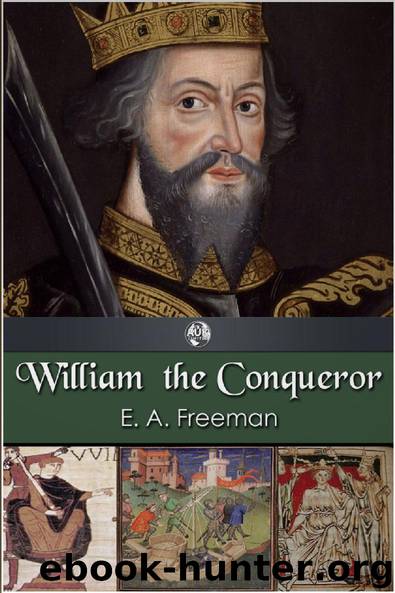William the Conqueror by E. A. Freeman

Author:E. A. Freeman
Language: eng
Format: epub
Tags: english, england, history, 1066, normans, norman conquest, king harold, Bayeux Tapestry, hastings
ISBN: 9781782340126
Publisher: Andrews UK Limited 2012
Published: 2012-06-22T00:00:00+00:00
CHAPTER IX - THE SETTLEMENT OF ENGLAND - 1070-1086
England was now fully conquered, and William could for a moment sit down quietly to the rule of the kingdom that he had won. The time that immediately followed is spoken of as a time of comparative quiet, and of less oppression than the times either before or after. Before and after, warfare, on one side of the sea or the other, was the main business. Hitherto William has been winning his kingdom in arms. Afterwards he was more constantly called away to his foreign dominions, and his absence always led to greater oppression in England. Just now he had a moment of repose, when he could give his mind to the affairs of Church and State in England. Peace indeed was not quite unbroken. Events were tending to that famous revolt in the Fenland which is perhaps the best remembered part of William’s reign. But even this movement was merely local, and did not seriously interfere with William’s government. He was now striving to settle the land in peace, and to make his rule as little grievous to the conquered as might be. The harrying of Northumberland showed that he now shrank from no harshness that would serve his ends; but from mere purposeless oppression he was still free. Nor was he ever inclined to needless change or to that scorn of the conquered which meaner conquerors have often shown. He clearly wished both to change and to oppress as little as he could. This is a side of him which has been greatly misunderstood, largely through the book that passes for the History of Ingulf Abbot of Crowland. Ingulf was William’s English secretary; a real history of his writing would be most precious. But the book that goes by his name is a forgery not older than the fourteenth century, and is in all points contradicted by the genuine documents of the time. Thus the forger makes William try to abolish the English language and order the use of French in legal writings. This is pure fiction. The truth is that, from the time of William’s coming, English goes out of use in legal writings, but only gradually, and not in favour of French. Ever since the coming of Augustine, English and Latin had been alternative tongues; after the coming of William English becomes less usual, and in the course of the twelfth century it goes out of use in favour of Latin. There are no French documents till the thirteenth century, and in that century English begins again. Instead of abolishing the English tongue, William took care that his English-born son should learn it, and he even began to learn it himself. A king of those days held it for his duty to hear and redress his subjects’ complaints; he had to go through the land and see for himself that those who acted in his name did right among his people. This earlier kings had done; this William wished to do; but he found his ignorance of English a hindrance.
Download
This site does not store any files on its server. We only index and link to content provided by other sites. Please contact the content providers to delete copyright contents if any and email us, we'll remove relevant links or contents immediately.
Fanny Burney by Claire Harman(25790)
Empire of the Sikhs by Patwant Singh(22184)
Out of India by Michael Foss(16315)
Leonardo da Vinci by Walter Isaacson(11914)
Small Great Things by Jodi Picoult(6108)
The Six Wives Of Henry VIII (WOMEN IN HISTORY) by Fraser Antonia(4797)
The Wind in My Hair by Masih Alinejad(4427)
The Lonely City by Olivia Laing(4122)
The Crown by Robert Lacey(4113)
A Higher Loyalty: Truth, Lies, and Leadership by James Comey(4038)
The Iron Duke by The Iron Duke(3650)
Millionaire: The Philanderer, Gambler, and Duelist Who Invented Modern Finance by Janet Gleeson(3575)
Sticky Fingers by Joe Hagan(3456)
Alive: The Story of the Andes Survivors by Piers Paul Read(3319)
Papillon (English) by Henri Charrière(3279)
Joan of Arc by Mary Gordon(3268)
Stalin by Stephen Kotkin(3090)
Aleister Crowley: The Biography by Tobias Churton(3026)
Ants Among Elephants by Sujatha Gidla(2928)
